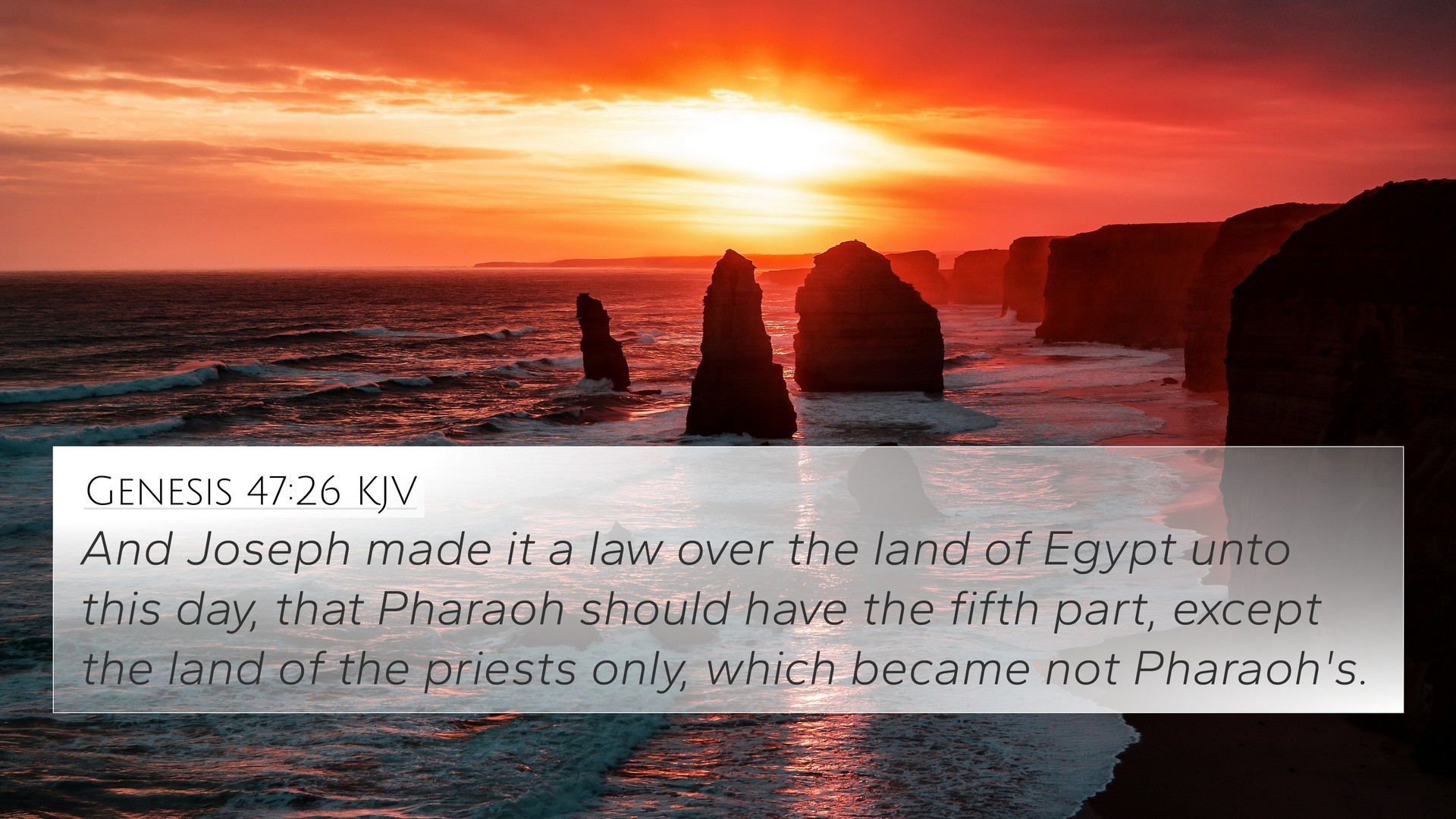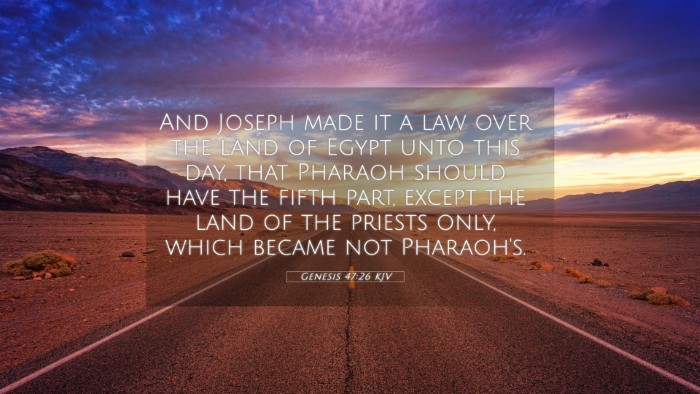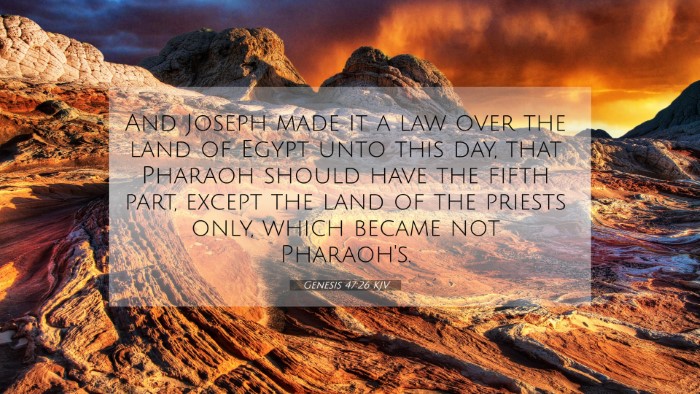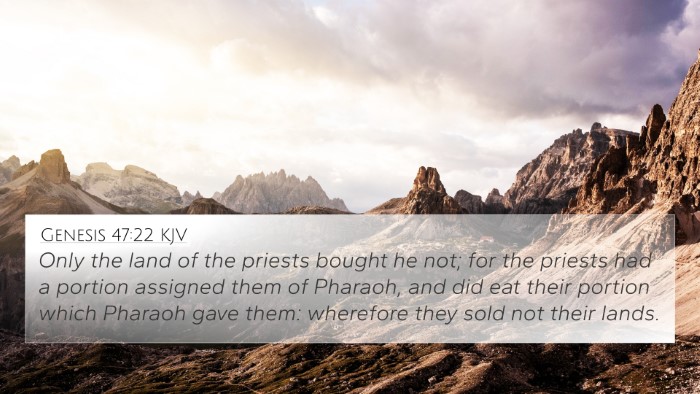Understanding Genesis 47:26
Genesis 47:26 states, "And Joseph made it a law over the land of Egypt unto this day, that Pharaoh should have the fifth part; except the land of the priests only, which became not Pharaoh's." This verse presents a significant moment in the narrative of Joseph's administration in Egypt during a time of famine. Let's explore its meaning and implications through insights derived from several public domain commentaries, including those by Matthew Henry, Albert Barnes, and Adam Clarke.
Context and Background
This verse is set against the backdrop of a severe famine that enveloped Egypt and the surrounding regions. Joseph, appointed as the governor of Egypt due to his wisdom in interpreting Pharaoh's dreams, devised an economic strategy to manage the crisis. The law introduced here is integral to understanding the socio-economic transformations in Egypt during this period.
The Purpose of the Law
The imposition of the fifth part of the harvest—often interpreted as a tax or tribute—demonstrates Joseph's foresight and administrative skill. As Matthew Henry notes, this law was not arbitrary; it was a response to a dire situation where resources were limited, and it served to stabilize the economy by ensuring a consistent supply of food during lean years.
Insights from Commentators
Matthew Henry emphasizes the significance of Joseph's regulations, stating that they were intended to benefit both Pharaoh and the Egyptian populace. He indicates that by setting aside a fifth of the produce, Joseph not only provided for Pharaoh's treasury but also safeguarded the wellbeing of the citizens in future years of scarcity.
Albert Barnes highlights the ethical dimension of these actions. He remarks that while this law laid the foundation for Pharaoh’s control over the land, it also presented a form of governance that adapted to the needs of the people during a time of crisis. This perspective mirrors Biblical themes of stewardship and wise leadership prevalent in both the Old and New Testaments.
Adam Clarke adds that the exclusion of the priests’ lands from this law highlights the special status of the religious leaders in society. This was a reflection of their role and influence, which protected them from the economic strategies employed by the state, symbolizing a theological principle of divine provision for His servants.
Bible Verse Cross-References
This verse connects with several significant Biblical texts, creating a web of understanding that enhances its meaning:
- Genesis 41:34-36 - Joseph's earlier proposal to gather grain during years of plenty to save for the years of famine.
- Exodus 1:11 - The establishment of taskmasters over the Israelites reflects the impact of centralized power introduced during Joseph's time.
- Leviticus 27:30 - The principle of tithing aligns with the fifth part tribute imposed by Joseph, echoing a consistent theme of giving back to God what is His.
- 1 Samuel 8:15 - A warning against heavy taxation by a king; a contrast to Joseph’s justified tax during a national emergency.
- Proverbs 21:20 - Wisdom in saving for future needs, which is precisely what Joseph's law aimed to achieve.
- Acts 6:1 - The early Church faced food distribution issues, paralleling Joseph's management of resources during the famine.
- Matthew 25:14-30 - The Parable of the Talents emphasizes responsible stewardship, akin to Joseph's management of Egypt’s resources.
Thematic Bible Verse Connections
Genesis 47:26 invites a comparative Bible verse analysis, showcasing how themes of governance, stewardship, and divine provision recur throughout scripture. These connections foster an understanding of the continuity of God's providence across different contexts. Here are some thematic connections:
- Stewardship: Responsible management of resources is a continuous theme in both Joseph's actions and the moral teachings of the New Testament.
- Provision: God’s provision for His people, as seen in Joseph’s law, echoes throughout scripture, from the manna in the wilderness (Exodus 16) to Jesus feeding the 5,000 (Matthew 14:13-21).
- Leadership: Wise leadership is exemplified in Joseph’s approach, which finds parallels in the leadership models outlined in the epistles, particularly in Paul’s instructions to elders (1 Timothy 3).
- Divine Favor: The favor shown to Joseph reveals God's sovereignty, similar to themes found in Romans 8:28 regarding God’s purpose for His people.
Inter-Biblical Dialogue
The theological and narrative strands woven throughout Genesis 47:26 create an inter-Biblical dialogue that enriches our understanding of scripture. By employing tools for Bible cross-referencing and utilizing a Bible concordance, readers can explore these connections further and implement cross-reference Bible study methods to draw deeper insights.
Tools and Resources
For those interested in exploring more about how to find cross-references in the Bible, consider using a structured Bible cross-reference guide or a comprehensive Bible cross-reference system to illuminate connections between different scriptures. These resources can significantly enhance the quality of your study and understanding of Biblical themes.
Conclusion
Genesis 47:26 serves not merely as an historical account but as a profound lesson in governance, stewardship, and divine provision. The insights gleaned from the commentaries of Matthew Henry, Albert Barnes, and Adam Clarke highlight its significance, showcasing the interconnectedness of scripture through thematic Bible verse connections and cross-referencing Biblical texts. As we reflect on this verse, may we be inspired to apply its principles of wise leadership and faithful stewardship in our own lives.




